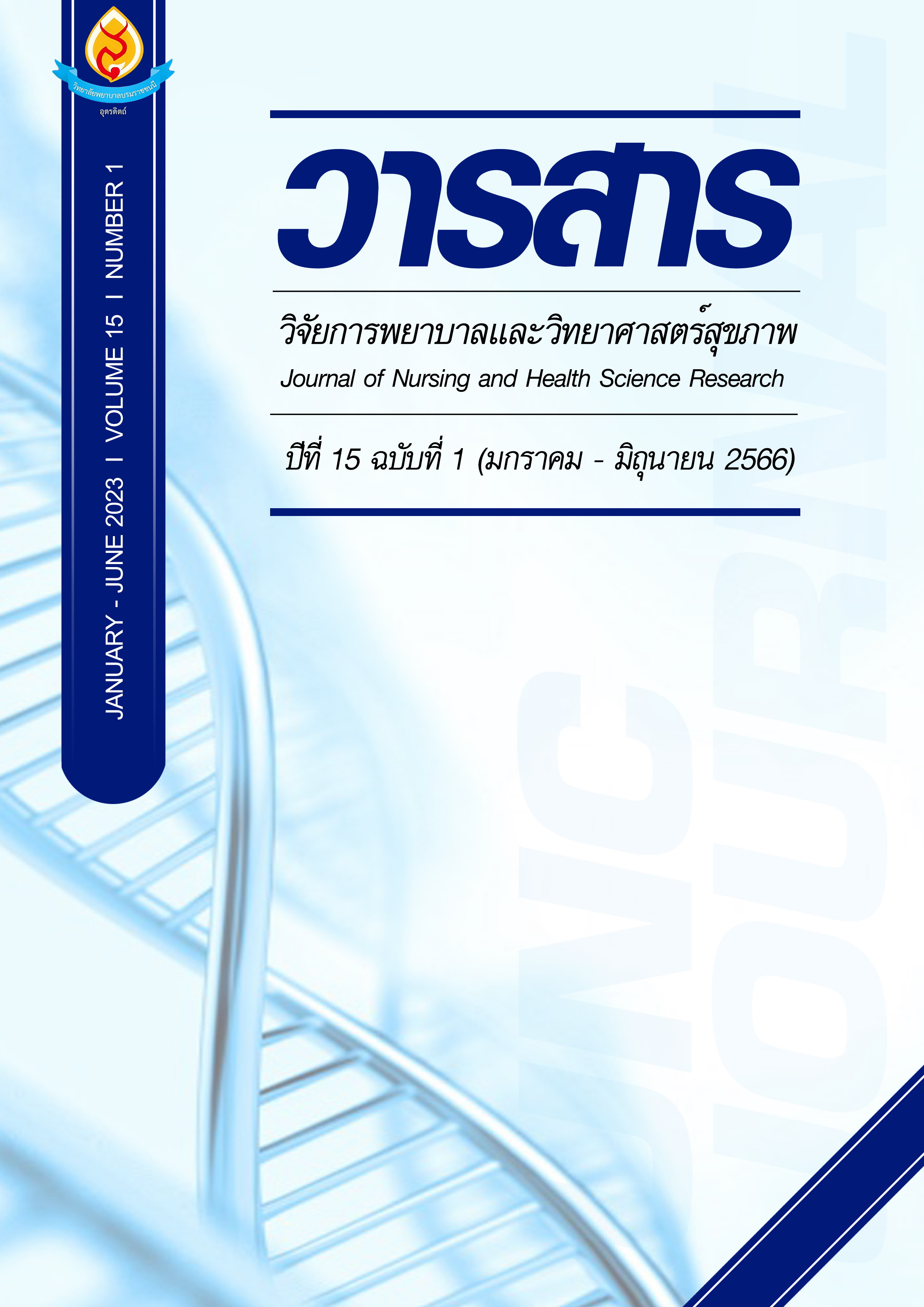อิทธิพลของความรอบรู้ด้านสุขภาพ การรับรู้สมรรถนะแห่งตน และการสื่อสารระหว่างผู้ป่วยกับทีมสุขภาพต่อพฤติกรรมการดูแลตนเองของผู้ป่วยความดันโลหิตสูง
Main Article Content
บทคัดย่อ
การศึกษาความสัมพันธ์เชิงทำนายมีวัตถุประสงค์เพื่อศึกษาพฤติกรรมการดูแลตนเองและอิทธิพลของความรอบรู้ด้านสุขภาพ การรับรู้สมรรถนะแห่งตน การสื่อสารระหว่างผู้ป่วยกับทีมสุขภาพที่มีต่อพฤติกรรมการดูแลตนเองของผู้ป่วยโรคความดันโลหิตสูง ในกลุ่มตัวอย่างที่มารับบริการในคลินิกโรคความดันโลหิตสูง โรงพยาบาลกุฉินารายณ์ จังหวัดกาฬสินธุ์ จำนวน 86 คน ที่ได้จากการสุ่มอย่างง่าย เก็บรวบรวมข้อมูลโดยใช้แบบสอบถาม ได้แก่ แบบสอบถามความรอบรู้ด้านสุขภาพที่มีค่าความเชื่อมั่น (KR-20) เท่ากับ .725 แบบสอบถามการรับรู้สมรรถนะแห่งตน การสื่อสารระหว่างผู้ป่วยกับทีมสุขภาพ และพฤติกรรมการดูแลตนเองของผู้ป่วยโรคความดันโลหิตสูงที่มีค่าความเชื่อมั่นเท่ากับ .962, .734, .895 ตามลำดับ วิเคราะห์ข้อมูลโดยใช้สถิติพรรณนาและการวิเคราะห์ถดถอยพหุคูณ
ผลการศึกษาพบว่าพฤติกรรมการดูแลตนเองของผู้ป่วยโรคความดันโลหิตสูงอยู่ในระดับดี (=137.98, SD = 7.27) การรับรู้สมรรถนะแห่งตนสามารถทำนายพฤติกรรมการดูแลตนเองของผู้ป่วยโรคความดันโลหิตสูงได้ร้อยละ 44.10 (R2= .441, p< .001) โดยทำนายได้ค่อนข้างมาก (β = .368, p< .001) และพบว่าความรอบรู้ด้านสุขภาพและการสื่อสารระหว่างผู้ป่วยกับทีมสุขภาพไม่สามารถทำนายพฤติกรรมการดูแลตนเองของผู้ป่วยโรคความดันโลหิตสูง
ข้อเสนอแนะจากการวิจัยคือกิจกรรมการพยาบาลเพื่อการดูแลตนเองในผู้ป่วยโรคความดันโลหิตสูงควรเน้นการส่งเสริมสมรรถนะแห่งตนของผู้ป่วย
Article Details

อนุญาตภายใต้เงื่อนไข Creative Commons Attribution-NonCommercial-NoDerivatives 4.0 International License.
บทความหรือข้อคิดเห็นใดใดที่ปรากฏในวารสารวิจัยการพยาบาลและวิทยาศาสตร์สุขภาพ เป็นวรรณกรรมของผู้เขียน ซึ่งบรรณาธิการหรือสมาคมศิษย์เก่า ไม่จำเป็นต้องเห็นด้วย และบทความที่ได้รับการตีพิมพ์เผยแพร่ถือเป็นลิขสิทธิ์ของวารสารวิจัยการพยาบาลและวิทยาศาสตร์สุขภาพ
เอกสารอ้างอิง
Bandura, A. (1998). Self-efficacy: The exercise of control. New York: Freeman.
Baker, D. W., Williams, M. V., Parker, R. M., Gazmararian, J. A., & Nurss, J. (1999). Development of a brief test to measure functional health literacy. Patient Education and Counseling, 38(1), 33–42. https://doi.org/10.1016/S0738-3991(98)00116-5
Cohen, J. (1988). Statistical power analysis for the behavioral sciences, (2nd ed.). Hillsdale, NJ: Erlbaum.
Du, S., Zhou, Y., Fu, C., Wang, Y., Du, X., & Xie, R. (2018). Health literacy and health outcomes in hypertension: an integrative review. International Journal of Nursing Science, 5(3), 301-319.
Division of Non communicable disease. (2019). Thailand national NCD plan 2017-2021. Retrieved (2021, July 13). from https://www.iccp-portal.org/system/files/plans /ThailandNationalNCDplan2017-2021.pdf. (in Thai).
Hongkrajok, H., Pathumarak, N., & Pathumarak, N. (2016). Influences of health literacy, perceived self-efficacy, and self-care behaviors among patients with primary hypertension. Royal Thai Navy Medical Journal, 43(2), 39 – 54. (in Thai).
James, P.A., Oparil, S., Carter, B.L., Cushman, W.C., Dennison-Himmelfarb, C. & Handler, J. (2014). Evidence-based guidelinr for the management of high blood pressure in adult: report from the panel members appointed to the eighth joint national committee (jnc8). The journal of the American Medical Association, 311(5), 507-520.
Jiopraditkul, S. (2020). Self – care behaviors and blood pressure controlling ability of essential hypertension patients, muang potawas primary care unit. Journal of Research and Innovation, 3(1), 15-30. (in Thai).
Kareesun, K., Malathum,P. & Sutti, N. (2019). Relationships among health literacy, knowledge about hypertension control, and health behavior in older persons with hypertension. Ramathibodi Nursing Journal, 2(1), 280-295. (in Thai).
Kummak, P., Kummak, S., & Kagmmnee, M. (2015). Factors related to self-care behaviors among patients with hypertension. The Southern College Network Journal of Nursing and Public Health, 2(3), 74-91. (in Thai).
Kutrakul, A. (2020). Perceived self-care efficacy of hypertensive patients in Sansai hospital, San Sai District, ChiangMai. Retrieved (2021, July 13). from https://search.lib.cmu.ac.th/search/?searchtype=.&searcharg=b1308355. (in Thai).
Manit, A., Tuicomepee, A., Jiamjarasrangsi, W. & Taneepanichskul, S. (2011). Development of needs and resources for self-management assessment instrument in Thais with type 2 diabetes: Cross+cultural adaptation. Journal of the Medical Association of Thailand, 94(11), 1304-1313.
Mayr, S., Erdfelder, E., Buchner, A. & Faul, F. (2007). A short tutorial of g power. Tutorials in Quantitative Methods for Psychology, 3(2), 51 – 59.
Namwong, A., Panuthai, S., Suwanprapisa, T. & Khampolsiri, T.(2015). A casual model of adherence therapeutic regimens among Thai older adult with hypertension. Pacific Rim International Journal Nursing Research, 19(2), 107-121. National Reform Council. (2020). Health literacy in Thailand. Retrieved (2021, July 13). from http://www.doh.hpc.go.th/bs/issueDisplay.php?id=444&category=E02&issue=HL%20Article
Neelasri, A. (2016). Factors affecting blood pressure control in patients with hypertension health promoting hospital Tambon Wang Nam Khieo, Kamphaeng Saen District, Nakhon Pathom Province. Region 4-5 Medical Journal, 35(2), 77 – 88. (in Thai).
Nutbeam, D. (2000). Health literacy as a public health goal : a challenge for contemporary health education and communication strategies into the 21st century. Health Promotion International, 15(3), 259-267.
Nutbeam, D. (2008). The evolving concept of health literacy. Social Science and Medicine, 67(12), 2072-2078.
Orem, D.E. (2001). Nursing concepts of practice. 6th ed. United States of America: Mosby .
Phimmasone, S. & Daenseekaew, S. (2016). Risk factors and self-care activities of patients with hypertension in rural area of Lao. Journal of Nursing and Health Care, 34(3), 48-53. (in Thai).
Prakobchai, S., Kusuma Na Ayuthya, S., Wattanakitkrilear, D. & Buranakitjaroen, P. (2015). Factors influencing medication-taking behavior of hypertensive patients. Journal of Nursing Science, 32(4), 42-51. (in Thai).
Sangwatanaroj, S. (2020). How to improve blood pressure control in Thai hypertensive population. Bangkok: Thai Hypertension (Public Organization). (in Thai).
Sinsap, N. & Jaimun, B. (2020). Health behaviors of the older adults with high blood pressure in Nakhon Ubol Municipal Area, Ubol Ratchathani. Journal of Health and Nursing Research, 36(3), 135-149. (in Thai).
Thi My, Methakajanasak & Van Minh. (2020). Relationships between hypertension knowledge, self-efficacy, treatment beliefs and self-management behaviors among uncontrolled hypertension patients in Da Nang city, Vietnam. Journal of Nursing Science & Health, 43(4), 59-71. (in Thai).
Thongma, P. (2020). Health literacy and health outcomesin hypertensive patients. Thai Red Cross Nursing Journal, 13(1), 50-59. (in Thai).
WHO. (2021). Hypertension. Retrieved (2021, July 13). from http://www.who.int/news-room/fact-sheets/detail/hypertension.
Wattanachai, J., Palungrit, S., Tiyao, N., Aninalabon, W., Boonnak, P. & Makpirom, J. (2021). Self-care behaviors of village health volunteers to prevent diseases and complications due to hypertension. Journal of Nursing and Health Care, 39(1), 108 – 117. (in Thai).
Xu Y. (2005). Understanding the factors influencing diabetes self-management in Chinese people with type 2 diabetes using structural equation modeling [Doctoral dissertation]. Ohio: University of Cincinnat.


